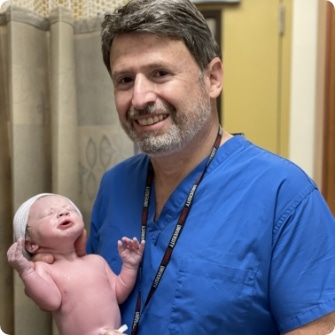
QUICK LINKS

What is Hereditary Cancer Screening?
One of the roles of an OB/GYN is to help identify women who are at-risk for hereditary cancer before cancer develops. This is important so that these women can undergo increased screening and other necessary measures to reduce their risks.
But how do you know if you have a predisposition to hereditary cancer in the first place? Today, genetic testing is available to pinpoint certain inherited changes in an individual’s genes that are a sign of inherited cancer susceptibility syndromes. Genetic testing can also be performed to determine if family members who have not yet developed cancer have the same gene mutation. By taking the steps to learn about possible hereditary cancer you are arming yourself with critical information so that you can be proactive in the preventative screening process.
“I highly recommend Dr. Tepper!He is highly professional, experienced, and calming. My pregnancy and birth were such a positive experience thanks to him and his lovely staff at the clinic.”
SEE MORECommon Hereditary Cancers
You may have an increased risk for developing gynecological cancers if you have a family history of cancer, have other family members with the BRCA1 or BRCA2 genes, are over the age of 50, or have human papillomavirus (HPV).
The most common syndromes that are related to breast and gynecologic cancers include:
- Hereditary breast and ovarian cancer syndrome: Is associated with mutations in the BRCA1 or BRCA2 genes, which can result in breast, ovary, melanoma, prostate, or pancreatic cancers.
- Lynch syndrome: Is caused by mutations in the MLH1, MSH2, MSH6, PMS2, or EPCAM genes which can result in uterine, ovary, colon, pancreatic, gastric, small intestine, central nervous system, renal, or sebaceous cancers.
- Cowden syndrome: Due to mutations in the PTEN gene, individuals with this syndrome may have a higher risk for breast, uterine, thyroid, colon, renal, and sebaceous cancers.
- Li-Fraumeni syndrome (LFS): This is caused by a mutation in the TP53 gene and is associated with an increased risk for breast, adrenal, brain, lung, and endometrial cancers.
- Peutz-Jeghers: Caused by mutations in the STK11/LKB1 gene, this syndrome puts individuals at risk for gastrointestinal, breast, ovarian, uterine, and cervical cancers.

MEET DR. ALEX TEPPER
Welcome to my practice. Let me introduce myself and my practice philosophy. I am a board certified OB/GYN in practice for over 20 years and have been a solo-practitioner on the Upper East Side of Manhattan since 2000. All deliveries are performed at The Mount Sinai Medical Center where I went to medical school and at Lenox Hill Hospital.
Types of Hereditary Cancer Screening
If it is determined that you have a higher risk for developing hereditary cancers, Dr. Tepper will recommend increased screening. Early detection of possible cancers is ideal, as treatment can be more effective for better outcomes.
Overall, your screening may differ depending on the type of hereditary cancer you are predisposed to. For women with a genetic predisposition to breast cancer, screening usually begins between the ages of 20-25 with MRI (mammograms are not used prior to age 30 in women with BRCA mutations). To check for other forms of cancer, your screening may include transvaginal ultrasound or endometrial biopsy. Dr. Tepper will speak with you regarding what you can expect your screening to look like, as well as how often you should undergo screening.
BOOK AN APPOINTMENT
Whether you are a new or returning patient, Dr. Tepper can assess your concerns and discuss your options to find the most comfortable and convenient care for you. To get started, call our office to set up an appointment.
CALL FOR APPOINTMENTContact Us to Learn More
For more information regarding hereditary cancer screening, contact our office today. We understand that facing the topic of cancer can be an overwhelming experience, which is why Dr. Tepper believes in educating each and every patient so that they can be proactive in their screening process.
Frequently Asked Questions
Does cancer show in blood tests?
How long can cancer grow undetected?
What is the first sign of cervical cancer?
What types of cancer screenings are available?
Our Blog

Exploring the Benefits of Early Pregnancy Ultrasounds with Alex Tepper OBGYN

Your Guide to Gestational Diabetes for Expectant Mothers in New York City



